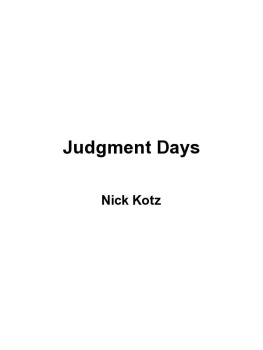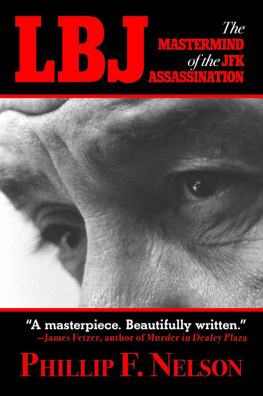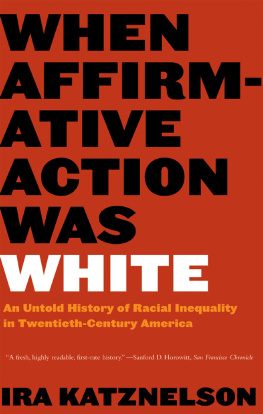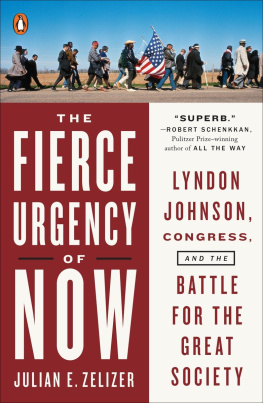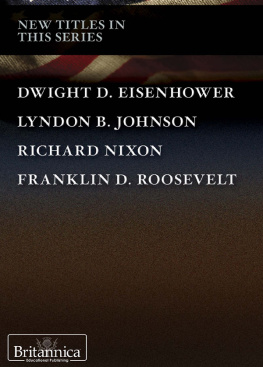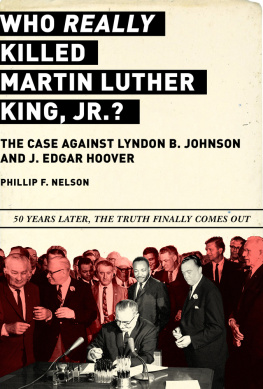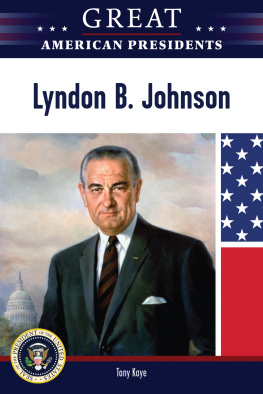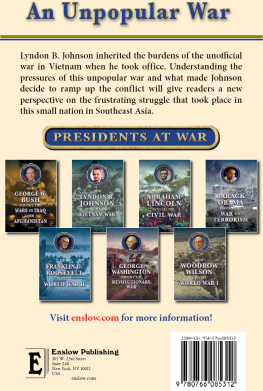First Mariner Books edition 2006
Copyright 2005 by Nick Kotz
ALL RIGHTS RESERVED
For information about permission to reproduce selections
from this book, write to Permissions, Houghton Mifflin Company,
215 Park Avenue South, New York, New York 10003.
Visit our Web site: www.houghtonmifflinbooks.com.
Library of Congress Cataloging-in-Publication Data
Kotz, Nick.
Judgment days : Lyndon Baines Johnson, Martin Luther King Jr.,
and the laws that changed America / Nick Kotz.
p. cm.
Includes bibliographical references (p. ) and index.
ISBN -13: 978-0-618-08825-6 ISBN -10: 0-618-08825-3
ISBN -13:978-0-618-64183-3 (pbk.) ISBN -10: 0-618-64183-1 (pbk.)
1. Johnson, Lyndon B. (Lyndon Baines), 19081973 Friends and associates.
2. King, Martin Luther, Jr., 19291968 Friends and associates. 3. Johnson,
Lyndon B. (Lyndon Baines), 19081973Relations with African Americans.
4. African AmericansCivil rightsHistory20th century. 5. African
AmericansLegal status, laws, etc. 6. United States. Civil Rights Act of
1964. 7. United States. Voting Rights Act of 1965. 8. United StatesPolitics
and government19631969. 9. United StatesRace relationsPolitical
aspects. I. Title.
E 847.2. K 67 2005 323'.092'2dc22 2004059852
Printed in the United States of America
Book design by Robert Overholtzer
MP 10 9 8 7 6 5 4 3 2 1
CREDITS FOR PHOTOGRAPHS following , in order of appearance: Cecil Stoughton, courtesy LBJ
Library; Yoichi Okamoto, courtesy LBJ Library; Yoichi Okamoto, courtesy LBJ Library; Cecil Stoughton,
courtesy LBJ Library; UPI photograph, courtesy Library of Congress, Prints & Photographs Division, LC-USZ 62
120208; Yoichi Okamoto, courtesy LBJ Library; Cecil Stoughton, courtesy LBJ Library; UPI telephoto, courtesy
Library of Congress, Prints & Photographs Division, LC-USZ 62-121116; New York World-Telegram & Sun staff
photo by Orlando Fernandez, courtesy Library of Congress, Prints & Photographs Division, NYWT&S Collec
tion, LC-USZ 62-122986; UPI telephoto, courtesy Library of Congress, Prints & Photographs Division, LC-USZ 62
122981; Courtesy Andrew Levison; UPI photograph, courtesy Library of Congress, Prints & Photographs
Division, LC-USZ 62-120985; UPI telephoto, courtesy Library of Congress, Prints & Photographs Division, LC
USZ 62-120215; UPI telephoto, courtesy Library of Congress, Prints & Photographs Division, LC-USZ 62-127732;
UPI telephoto, courtesy Library of Congress, Prints & Photographs Division, LC-USZ 62-122428; UPI photo
graph, courtesy Library of Congress, Prints & Photographs Division, LC-USZ 62-120214; Yoichi Okamoto, cour
tesy LBJ Library; Lee Balterman/Stringer/Time Life Pictures/Getty Images; Yoichi Okamoto, courtesy LBJ Li
brary; Robert Knudsen, courtesy LBJ Library; Yoichi Okamoto, courtesy LBJ Library; Yoichi Okamoto, courtesy
LBJ Library; Joseph Louw/Getty Images; Frank Wolfe, courtesy LBJ Library
For Mary Lynn Kotz
Once more the method of nonviolent resistance was unsheathed from its scabbard and once again an entire community was mobilized to confront the adversary. And ...Selma, Alabama, became a shining moment in the conscience of man.
M ARTIN L UTHER K ING J R .
March 25, 1965
Their cause must be our cause too. Because it is not just Negroes, but really it is all of us, who must overcome the
crippling legacy of bigotry and injustice. And we shall over
come.
L YNDON B AINES J OHNSON
March 15, 1965
Can the liberties of a nation be thought secure when we have removed their only firm basis, a conviction in the minds of the people that these liberties are the gift of God? That they are not to be violated but with his wrath. Indeed, I tremble for my country when I reflect that God is just: that his justice cannot sleep forever.
T HOMAS J EFFERSON
"Notes on the State of Virginia," 1787
The mystic chords of memory, stretching from every battlefield and patriot grave to every living heart and hearthstone all over this broad land, will yet swell the chorus ofthe Union, when again touched, as surely they will be, by the better angels of our nature.
A BRAHAM L INCOLN
March 4, 1861
Fondly do we hope, fervently do we pray, that this mighty scourge of war may speedily pass away. Yet, if God wills that it continue until all the wealth piled by the bondsman's two hundred and fifty years of unrequited toil shall be sunk, and until every drop of blood drawn with the lash shall be paid by another drawn with the sword, as was said three thousand years ago, so still it must be said "the judgments of the Lord are true and righteous altogether."
A BRAHAM L INCOLN
March 4, 1865
Introduction: Second Emancipation
T HEY WERE UNLIKELY PARTNERS, the master politician who became president and the eloquent minister who led a revolution. They were suspicious of each other: the president, a rough-talking Texas white man who had lived through a time of rampant racism in the South; the preacher, a southern black visionary who inspired the nation by fighting a nonviolent war.
Yet they came to work together, in a political pas de deux of immense complexity and fragility, to produce the most dramatic social change in America since the Emancipation Proclamation. When it happened, with the passage of the 1964 and 1965 civil rights acts, the Reverend Martin Luther King Jr. told the president of the United States, "You have created a Second Emancipation."
"The real hero is the American Negro," replied Lyndon Baines Johnson.
These two were the indispensable leaders, in the right place at the right time to effect the end of legal apartheid in America. Without the synergy they created together, the outcome of the civil rights revolution would have been very different. That brief moment in the 1960s, a time of jolting social and political turbulence, created significant consequences for all of its citizens. Inspired by the hopes, the dreams, and the acts of courage performed by countless African Americans, along with their white allies, the revolutionaries believed that America ought to be a more just society, a country more firmly anchored to the words the Founding Fathers inscribed in the Declaration of Independence and the Constitution. It so happened that the president of the United States shared those beliefs, to the surprise of many, especially his fellow white southerners. Out of the leadership of Johnson and King came strong new federal laws that erased the indignities of being denied the right to vote, to eat in a restaurant, to use a public restroom, to hold a job, and to choose one's dwelling place strictly because of the color of one's skin, the origin of one's ancestors, or one's gender.
The changes in the status of African Americans and other minorities empowered by the laws emerged from a long history of men and women striving for equality over many generations, dating from appeals to the first Congress in 1789. But those who stood up for change in the 1960s have a special place in that history. A panoply of events and circumstances converged then to create a unique opportunity for the nation to move closer to its ideals. Without tens of thousands of demonstrators demanding change as they transformed restaurant counters into venues for sit-ins, bus trips into Freedom Rides, and voter registration lines into bloody battlefields, the shining moment of the 1960s never would have become even a possibility. Yet for the revolution to succeed, it required extraordinary political leadership from individuals who felt the pressure of the civil rights movement, responded to it, and seized the moment, leaders with sufficient vision, skill, and courage to realize concrete achievements during a brief opportunity for change.
The alliance between Johnson and King was critical in turning opportunity into a realized American dream. They played their roles brilliantly. The dynamic interaction between the two men was remarkable, as were their willingness and their ability to overcome differences, accommodate each other's political needs, and work in complementary ways.
Next page
